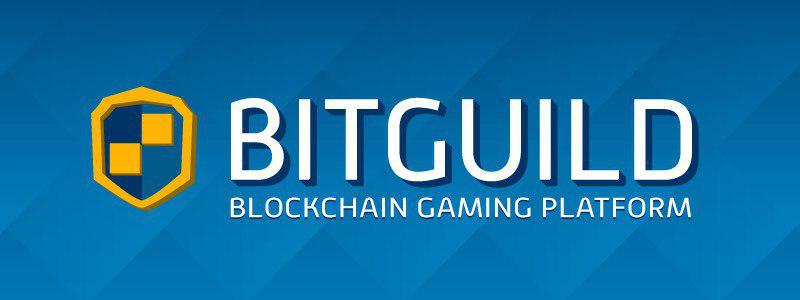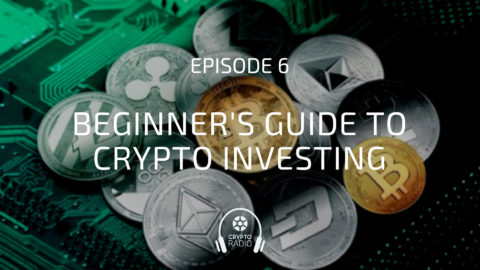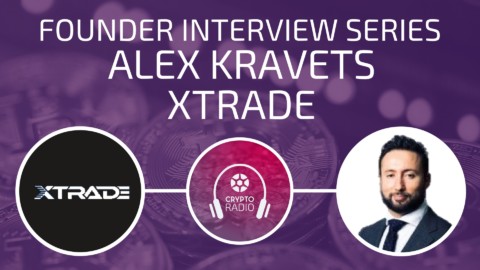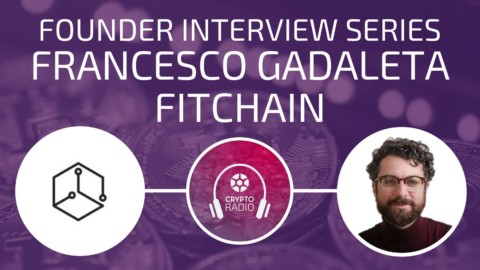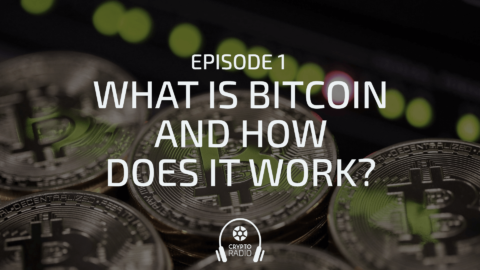Podcast: Play in new window | Download
Euvie: Hi crypto world. I’m Euvie Ivanova and today in the thought leader series we have Jared Psigoda, the founder and CEO of Bitguild. This is the second half of our conversation with Jared. In this episode, we go deeper into discussing the evolution of gaming, [00:01:00] why digital assets have value, and the idea of a cashless society. To get the show notes from this episode, go to cryptoradio.io/bitguild2. To listen to the first part of this interview on the founder series, go to cryptoradio.io/bitguild1. To learn more about Bitguild, the sponsor of this show, go to cryptoradio.io/bitguild. Alright, let’s dive in.
Mike: [00:01:30] Okay, Jared, welcome. This is the thought leader portion of our interview with you. We figured after our conversation with you that there might be some more interesting topics we can cover, especially with your history and experience in crypto and gaming. What would you like to start talking about?
Jared: There are a couple things I’m interested in talking about, one of them is the evolution of digital assets having value. [00:02:00] Number two is a cashless society. As we mentioned in the previous interview, I started buying, selling, and trading virtual currencies back in 1999. There’s actually a film, a documentary, I was in called Play Money, which you guys can check out at playmoneyfilm.com, which was filmed back in 2008 but for some reason was just released this year. That films followed a few individuals: myself, Marcus [inaudible [0:02:28], Mike Donnelly, [00:02:30] and Brock Pierce.
Broke Pierce is a name I’m sure many of you are familiar with. We were Individuals who were involved in the trading of virtual currencies and virtual items long before Bitcoin was a thought in anybody’s mind. As I mentioned earlier, we started selling virtual items on eBay in 1999. What happened was that, at that time I was 13 years old, so I went to my mum and my dad, I’m like, “Hey, I just sold $100,000 gold in this [00:03:00] video game and I got $150 for it.” They looked at me and there was absolutely no way for them to comprehend. I think this was a thing for several years where, at that point in time, the concept of virtual item or virtual currency that you could not hold in your hand, that was not tangible, having real world value was not understandable to 99 percent of the people out there.
I think it was understandable for us, as people who had [00:03:30] grown up and spend thousands of hours inside those virtual worlds. I think the really interesting thing is the concept of what is value. Essentially, value does not necessarily mean that you can hold this in your hand or that it’s tangible. From an economic perspective, if people think something is valuable then it is valuable. It’s been very interesting to see the game industry as precursor to the cryptocurrency industry. [00:04:00] Believe it or not, if you actually look at who some of the top people in crypto behind the scenes are, a lot of them are from the gaming industry and a lot of them are specifically from the industry of game item and currency trading.
Because when Bitcoin came out, they were like, “Hey, mine virtual coins that are worth real money.” Like, yeah, I get that, that makes perfect sense. So, we’ve watched the industry grow in gaming from 1999 when items first became viable and [00:04:30] sellable on eBay to games like World of Warcraft, which is one of the most successful online multi player games of all time. Where basically there was a huge economy of hundreds of millions of dollars every dingle year of gold from World of Warcraft items and power levelling of character accounts.
It was a massive, massive economic and there’s massive, massive demand to it. Later on, getting into free to play gaming, it’s now completely [00:05:00] normal for you to play Candy Crush for free but be willing to spend 99c to buy virtual lives. For a lot of these free to play games for you to buy a sword or armour or a weapon or an upgrade, or to sell your character, sell your account, or buy a skin, buy a cosmetic item that in League of Legends or Fortnite, it just makes you look cooler if it has no real value other than that.
I think it’s an interesting concept that just as somebody might want to buy a Louis Vuitton bag in real life, there’s a whole group [00:05:30] of people out there who would buy a rare League of Legends skin for $20, $50, or even $100. It’s just a philosophical thing that I’ve been thinking about over the past 10 years is, you know, what is value, what is real, what is virtual, has been changing over time. Which segues perfectly into cryptocurrencies like, “Hey, Bitcoin could be just as real as the US dollar or any other quote unquote ‘rea’ currency out there,” and seeing how that evolves over the years.
Euvie: [00:06:00] Yeah, it’s kind of like whatever people believe has value can have value in a way.
Jared: Yeah, from an economic standpoint value is if people believe it has value then it has value and it’s pretty much as simple as that.
Mike: I’m assuming because you’re so deep in the gaming industry that you were paying attention to what was happening with the Star Wars Battlefront 2 debacle on Reddit?
Jared: That was terrible. Yes.
Mike: Why don’t you give us a bit of background on what happened, for people who are not familiar, then why they did it so badly, and how they could have done it differently.
Jared: [00:06:30] The Star Wars debacle, I think that was the most downvoted post on Reddit of all time. Basically, EA created this awesome Star Wars game and, like any other game, they charged $50 or $60 or whatever it cost and people spent that $60, they bought their game, they were super happy, and then they realized that they couldn’t play is Darth Vader, one of the main characters of the game. They realized that it would either cost hundreds of hours of [00:07:00] grinding in the game, or they had to essentially purchase it with real money.
People that got into the game, that spent their $60, and you expect to have tens or hundreds of hours of a great gaming experience for that cost, but then they realize the stuff they really wanted, they had to pay additional money for it inside the game and people were just pissed off at that. It was such an active greed to do that, that they essentially lost a good portion [00:07:30] of their fan base in the gaming community because it was just too much.
Mike: Their stock price actually went down quite a lot, as well, after that.
Jared: Yeah, their stock price had a huge tumble that day. It’s like, “Hey, we understand that the gaming industry, these companies are public, they need to make profit.” But the industry has gotten to a point where you’ve got to ask, “What’s the cost to the player for all of this profit going into these game companies?” Honestly, as somebody who’s worked in the game industry for 10 plus years, [00:08:00] it’s not what it used to be.
When we started out, we were like, “Hey, let’s try and build the best experience we can build for that $50 or $60.” It evolved, especially with free to play gaming, where we stopped talking about the user and what made them happy. It was all an Excel spreadsheet that said, “How can we get as much money as possible out of each individual user?” We could sell this item for $10, or [00:08:30] we could sell a chance to get this item for $1. It’s like the loot box or the gadget mechanic. There are so many addiction loops and mechanics built into the design of all these games out there that the industry was not quite as fun as it used to be. It turned more into digital cigarettes than it did really creating a fantastic game experience.
Games like Fortnight, PUBG, League of Legends, they only sell cosmetic items. I think those are great but, unfortunately, a lot of free to play gaming is built around [00:09:00] random chance and addiction mechanics. We call them spreadsheet games, they’re basically big math equations on how to extract as much money as possible from the gaming community.
Mike: And that debacle was so bad that several countries around the world started working on laws to prevent loot boxes in direct response to what EA did with the Star Wars game.
Jared: Exactly. Loot boxes have been around since the beginning of time. I’m not necessarily 100 percent against loot boxes – baseball cards are [00:09:30] a perfect example. Baseball cards, it was super fun to go to the store on our birthday and get a big box of baseball cards and open them up and look for the rare card. We’d actually go to the library and rent the book where you could look up Babe Ruth 19 whatever, there was a price for that card. Unfortunately, the thing about loot boxes and free to play games is that 100 percent of that money is going to the developer, it’s a complete sink.
At least in a blockchain environment, if you’re able to sell [00:10:00] everything that you acquire from the loot box then I think it’s a little bit of a better bargain. Loot boxes have been such an issue in free to play gaming, it’s become a legal issue as to how countries should actually go in there and monitor loot box odds essentially. Yeah, EA, they did some bad stuff with Star Wars.
Mike: This is almost like taking those physical collector items, like you said baseball cards or it could be any number of cards or POG or any of those tradeables that we remember from our childhood, [00:10:30] but now we’re digitising all of it. Do you have any concern about the sort of ease with which people can create these assets and potentially just an oversaturation of these digital assets that people roll their eyes, “Yeah, just another one of these.”
Jared: I think it’s definitely going to happen. To create a digital scarce asset is a couple lines of code and solidity right now, it’s not difficult at all. A lot of the original games coming out there are Crypto Celebrities, Crypto Countries, Crypto Cities, crypto this, crypto that, [00:11:00] which Is basically scarce collectible assets. I’m not so much as worried about that, I think the actual good, interesting projects out there, they’re going to need to build massive market demand.
For example, something like Magic the Gathering, if that was on blockchain, something like Pokémon cards if that was on the blockchain. If you’re able to have a huge community that thinks that this one game and these assets are valuable, then I think they’re going to be valuable. People can go out and create scarce assets but if nobody’s using them, [00:11:30] again, if I create a scarce asset game and there’s 15 people playing it every day then they’re not worth anything more to that community. I think the market will essentially make up its mind about which scarce assets are actually valuable and which aren’t. There has to be a lot of people that use it, they can’t just be scarce.
Euvie: Yeah, it’s like at that point it becomes about culture more than about the actual scarce asset, what can you build around it.
Jared: Right. Going back to the baseball cards example, [00:12:00] if I just took a bunch of pictures of baseball players and wrote a little description on each of them and tried to sell them myself, then, yeah, I could create scarcity but I’m sorry, it’s Tops or whoever the company is, their stuff is valuable but my stuff is not valuable. So, there’s multiple factors at play. I’ve lived in China now for about 10 to 12 years. One of the interesting things that I’ve seen is that in China we do not use cash at all [00:12:30] anymore essentially. I think talking about the potential for a society in the future that is exclusively run on a non-tangible virtual currency, I think that’s something that could be interesting.
In China, it’s all Alipay or WeChat Pay or whatever. I literally haven’t taken money out of the bank in China in three years, which we’re way behind, way behind in the United States. Most people would think we’re on the forefront of all things technology but we are definitely not.
Euvie: Yeah, [00:13:00] digital currency is one thing and then if it’s linked to Fiat currency that’s the first step in some ways, then there’s also the digital currencies that are not linked to Fiat and then there’s the digital tokens that are not necessarily currencies but might be access tokens or might be spendable in some ways.
Jared: Yeah, that’s correct. Right now, in China, basically, again this is getting into the tangible non-tangible question, but the WeChat Pay and Alipay [00:13:30] are such a big presence in Chinese society that it’s insane. One of the reasons they’re such a big presence is because of their payments essentially. I mean, a very brief history is that in all countries around the world people have been trying to do digital payments for quite a while. We’ve got PayPal in the west, we’ve got all this stuff. The concept of using PayPal to pay for a taxi ride or something, it never took off in the west.
Whereas in China with WeChat Pay and Alipay, you could [00:14:00] basically pay for your taxi, you could pay for your coffee, you could pay for essentially anything. What started out as just being able to pay for virtual goods, later on I could pay for a thing of noodles down at the corner at the little mum and pop shop. I could pay for things online for these services but I could also just scan a QR code and pay $1 for my thing of noodles. QR codes are such a big deal in China, they never really took off in the west I guess.
China is [00:14:30] essentially a cash free society with a digital wallet through WeChat or Alipay that you can pay for anything you want. You can essentially store your money and get returns, just like you could in a bank, you could invest it in stocks or mutual funds or whatever. My question is, in the rest of the world, in western societies, would it be possible in the future to do that with a digital currency like Bitcoin or like Ethereum? Because the user experience is actually very, very similar to paying for a cup of coffee [00:15:00] in China with your [inaudible [0:15:01] that’s in your WeChat Pay or your Alipay. You walk up to the counter, you see a QR code on a little piece of paper there, you scan the QR code, you type in $1, you press ‘OK’, and the store gets the $1 and you have essentially paid for your coffee.
I am very interested in the potential for the US or other countries to maybe skip that part of using Fiat currency linked to a digital wallet, and would it possible in the future to use digital currency linked to a digital wallet to [00:15:30] allow these countries to evolve into a cashless society. It’s just a food for thought type question.
Euvie: What can some of these other countries learn from what they’ve done in China? What are some of the key lessons that have emerged over the years that this system has been in place?
Jared: I think number one is get the fuck rid of cash. Why are we still using cash? I don’t understand, there’s absolutely nothing, especially in Europe, the US to quite an extent but Europe as well, [00:16:00] there are so many places out there that only accept cash. You’ve got to go to the bank, you’ve got to take it out, you’ve got to worry about it getting stolen, there’s coins, they’re clunky, they take up a lot of space. There’s absolutely no reason really for a country to still use cash. I think that is number one. Number two, we still write cheques in the United States.
Every time I come back it’s absolutely mind blowing that if you want to pay a lot of rent or bills, there’s some places where I have to get a cheque book, I have to write down your name, [00:16:30] $500, I have to get an envelope, I have to write your address, physical address, on that, get a stamp, put it in the mail, send you the cheque, you have to take that cheque and walk into the bank, wait in line, sign the cheque, give it to them at the counter. Good God, it’s 2018. There’s no reason, with today’s level of technology, that we should be doing all this stuff.
Number one I think is we need to work towards cashless society. Number two is the technology is in place, [00:17:00] especially with the blockchain, we don’t really have to worry about the fraud and the other issues that we had before. I don’t think it’s going to happen necessarily at a government level because they don’t have the incentive. But at a business or a personal level, it’s a pain in the ass to use cash every day.
Mike: Yeah, it’s interesting. This is my second time coming to the States and I’ve only been here for a couple weeks now. It’s interesting how many places don’t accept cash whatsoever, it’s card only. Then on the other side, how many are no card only cash.
Jared: Honestly, in China, I will leave on a two week [00:17:30] business trip and I won’t have anything but my phone. I don’t even need a credit card let alone anything. Everything is just scan a QR code and pay. My phone is linked to my debit card account, so it makes life so much easier.
Mike: Yeah, I wish we had that in Europe and the States right now.
Jared: Yeah, Europe and the US, when it comes to Fintech, I think are lightyears behind Asia.
Euvie: Yeah. What are some of the other lessons, for example, with scaling or adoption that could be used? [00:18:00] I’m guessing that the cell phone smart phone penetration in China would have to be really, really high for that to work.
Jared: Here’s the thing. To push digital currency payments, regardless if that’s a cryptocurrency or if it’s just a Fiat currency running through digital measures, you have to have a context for it. It’s actually a very interesting story in how this happened in China. There were two major use cases that pushed the adoption of cryptocurrency in China. One of them is [00:18:30] cultural, so not everybody would understand it. The other is not cultural. The first one was actually let’s talk about WeChat. WeChat is the largest messaging platform in China, it almost has 100 percent penetration.
People don’t call or text or anything like that anymore. They use WeChat to send a text message, calls, video chats, group chats, whatever. There is a team of three or five people at Tencent, which is the company that owns WeChat. As a joke project, they decided to make [00:19:00] a function in WeChat called the Red Envelope, or hongboa in Chinese. This is part of a Chinese culture that, every year, when you go home for Chinese New Year you give these red envelopes, which are red envelopes with cash. If you’re a kid then your aunts and your uncles and your grandmas will give you this envelope with a little bit of money in it, it’s a yearly tradition.
As just a joke, a small team at WeChat built that [00:19:30] functionality into the app itself. They had gotten their payment infrastructure there and they built this thing where you could send a red envelope to a group chat, number one. Number two, that red envelope you could say, “I’m going to put ¥100 into the envelope but it’s going to be for 15 people and everybody who clicks on the red envelope is going to get a random amount of money.” If there’s ¥100 and there’s 15 people, then one guy might get ¥30 [00:20:00] and the other guy might get 3c.
So, it became this really, really fun thing where people were sending these red envelopes filled with money to all the chat groups they were in. It absolutely exploded. I think because it had a context, everybody was going home for Chinese New Year, they were giving red envelopes anyway, and it was gamified in a way that it was fun. There would always be that one guy who only got 5c when everybody else was getting a lot of money. That pushed adoption as [00:20:30] the first step.
The second stop was linking up with DiDi taxi. Where the US had Uber, China has a company called DiDi Dache which is the Uber of China essentially. When it first started, it was basically like everybody was calling their taxis with the ride hailing app but then they would pay with cash, because Chinese people do not really use credit cards. Until WeChat or Tencent essentially made an investment in the ride hailing app and they added something in where [00:21:00] you could pay through WeChat. Not only could you pay through WeChat but you would also get a big chunk of money off or you would get money back and the drivers would get extra money.
They essentially used a stipend to incentivize both the drivers and the passengers. What that did is that was a very clear every day context that people were using of taking taxis and they implemented this digital payment system as the preferred way and the incentivized way [00:21:30] of taking taxis. Once they had these very high frequency daily events occurring with their digital wallets, then essentially it was very easy to push things from there. A lot of it is the inventive mechanism, a lot of it is the context of having a real-world use case and not just saying you can send money to somebody. Context is everything in pushing new technologies if the technology itself is not good enough.
Euvie: Right. You had a second story there I think, as well.
Jared: The second story [00:22:00] was just about the taxis. After that it basically just came down to both WeChat, which is Tencent, and Alibaba going around the country and just, on a massive scale, one store at a time getting people to put these QR codes next to their cash registers to be able to pay. Once they started doing that then it became habitual to scan a QR code and pay for your cup of coffee or pay for your noodles. Once it became habitual, then everybody stopped [00:22:30] withdrawing cash, they stopped using credit cards, they stopped using their bank cards. It was one step at a time.
Euvie: Yeah, wow. A very interesting combination of a bunch of different things. I’m interested actually to talk a bit more about incentives and gamification. Blockchain technology presents a unique ability to bake them into the system. What are some of the examples that you can think about of that being used really well and what are some of the examples you can think about of it going terrible wrong?
Jared: [00:23:00] Terribly wrong, I’d have to think about that one. Pushing WeChat and Alipay and digital payments in China using essentially a two-sided stipend, which is basically the company just spent a lot of money. I guess Uber did this, as well, to give the drivers a couple bucks for every ride where they used the currency, and the same for passengers. Obviously in a cryptocurrency space you have the ability to incentivize users with tokens, essentially, for different actions. I think that’s something that people need to be [00:23:30] careful about that has a lot of great potential.
I’ve got a friend right now who, again, back to the ride sharing application is building a ride hailing application on the blockchain. This guy is actually the guy who built one of the largest ride sharing apps in all of China who just happens to be one of the foremost pioneers in cryptocurrency in China. Their thought is, essentially, you have your own token and you can use that token, you basically mine or create [00:24:00] X amount of tokens for a period of time and you give that to the drivers and you give that to the passengers. It all happens within their own ecosystem.
Also, what happens is that every time somebody takes a ride using this ride sharing app in one of these cars, is that the platform takes a fee and it takes that fee and it burns the tokens. I think what we’re going to see in a lot of these real-life service industry applications of the blockchain is we’re going to see token burning as a mechanic to long-term increase the token value [00:24:30] for users. The more the app is used, the more people take taxis, the more tokens are burned and that creates value for the drivers, creates value for the users and basically the investors and everybody within the whole token type of ecosystem.
In terms of examples – that’s not out yet but it should be out fairly soon. They’re [inaudible [0:24:46] themselves a social experiment just to see what happens, because nobody’s really taken blockchain to this level quite yet. Here’s a great example of incentives being used in a bad way. You know Korra, right? [00:25:00] Way back, I don’t know, 5, 10 years ago when these question and answer websites were coming out, the original way of building them was to have a financial incentive for people to answer the questions that were posted on those platforms. Every single one of them failed and lost out to the platforms with no financial incentives, but with a reputation system.
I think that’s a fascinating [00:25:30] example of incentives are not always the best thing or the most useful thing to get people to do something. Those platforms, Korra, it was just a reputation system, you didn’t get money. Wikipedia, you don’t get money for creating or editing entries, which is interesting because there are a lot of blockchain projects out there right now that are based on the concept of incentivising users for doing things like answering questions or creating [00:26:00] a blockchain Wikipedia and stuff like that. Historically speaking, those have proven to be failures. So, I’m interested to see what happens with a lot of these projects in the blockchain space that are coming out based on the concept of incentivising people for sharing knowledge.
Euvie: Yeah. Then like you mentioned, there are non-monetary incentives like reputation or points or social standing in a community and that can also be tokenized on the blockchain.
Jared: Correct.
Mike: [00:26:30] Then doesn’t it become a monetary incentive once it’s done that?
Jared: If it’s tradable, it essentially becomes a monetary incentive in my opinion.
Mike: Yeah, I agree. Which, if they’re not motivated in that way, then if you combine them, I could see that being a problem. It doesn’t mean you couldn’t have reputation in a blockchain system, just not having it be transferable would maybe be the solution in that case.
Jared: The question of why on the blockchain, I think blockchain is linked to tokens and tokens are linked to transfers of value. It would be an immutable [00:27:00] reputation score on the internet, but I don’t think that’s ever really been a problem. You’re not really solving any problems in industries.
Mike: Yeah, true. What do you think about platforms like Telegram coming on? They obviously had this absurd ICO raise something like a billion dollars and now they’ve got all these plans to do what it sounds like is the same thing as what WeChat has done.
Jared: I believe one of the best used of the blockchain is going to be integrating digital payments into a messaging app. Messaging apps like WeChat, Messenger, [00:27:30] Telegram, are the highest frequency applications in the world. It makes sense for me to be able to send you $10 in a message or to send you 10 tokens in a message and everything like that. One of the things I’m actually most fascinated in is a messaging app with a cryptocurrency wallet. However, Telegram was too fucking expensive, so I don’t know if they’re going to be the ones to pull it off.
We were looking at all of these presales and everything like that and the tokens just [00:28:00] being transferred from party A to party B to party C. I don’t know if it’s going to be Telegram who pulls it off, however, I do believe in the concept of a messenger with crypto wallet functionality.
Mike: Yeah. To me, that has mass adoption written all over it.
Jared: It does but, again, I don’t know if… Personally, I’m not a huge fan of Telegram. I don’t think it’s a very user-friendly commercial application. I still personally think that the application should be developed for mass market but with cryptocurrency functionality that doesn’t [00:28:30] interfere with the rest of the functionality of the app.
Mike: Yeah, I completely agree. We stopped using Telegram, it was just so frustrating to try and organize business chats. We switched over to Discord and I would love to see Discord implementing a wallet. That would be amazing.
Jared: Right, Discord I great. I love Discord. Telegram I can’t even figure out how to add people to a group. All of these messengers like Telegram are based on your phone’s address book, which in a lot of places in the world we don’t use text messaging or make that many phone calls. So, it makes sense to have [00:29:00] a separate identity system than just pulling phone contacts.
Mike: Yeah, if I’m traveling and I buy a new PC or a phone, I have to wait ‘til I’m back in my home country where my phones working with my normal number in order for me to use their app.
Jared: Right. I’m not a fan. Also, I just think their ICO raised too much money. It was a lot of smart cryptocurrency people buying the tokens for cheap and reselling them to more traditional investors who like the name power of Telegram. Now, they have a chance, they could pull it off. [00:29:30] If you give somebody a billion or two billion dollars, it’s amazing what kind of stuff they can make happen. You know how it goes.
Mike: Exactly. As far as pulling it off, there’s two different approaches we’ve been looking at a project like this from, which is what’s the potential ROI for investors and then what’s the potential of them executing on the project. From an investor standpoint, Telegram absolutely sucks unless you’ve traded up during the presale or ICO. As far as their ability to execute now, it’s probably incredible.
Jared; They’ve got a lot of money to play around with. [00:30:00] When you have a lot of money you can hire the best talent, you can hire the smartest people. We’ll see how it goes.
Euvie: What excites you about the crypto space right now? Obviously, even in terms of the market itself, it’s gone from this very rapid bubble to this very upsetting bare market. Now, it seems that the sentiment is like, “This year is the year to build,” or [inaudible [0:30:20] as people are calling it, kind of a play on words with [inaudible [0:30:23]. What are some of the exciting things that are being built right now?
Jared: I love it. [00:30:30] Honestly, the space is just fascinating to me in general. I’ve always been very interested in the concept of what is real and what is virtual. The game company I started back in 2010 was called Reality Squared Games and that was built around the concept that the real world is getting to feel getting to feel more and more virtual, and the virtual world is getting to feel more and more real. Yeah, we’re definitely in a bare market, but I think people who are the initial believers are a little bit sick of… there is a lot of bad actors in the market, there’s a lot of fraud [00:31:00] projects, there’s a lot of pyramid schemes out there.
There’s a lot of, “Hey, that white paper sounds all good and great, and you’ve got all of these fantastic advisors and people on your team, but I don’t think you have a chance of actually building this. Your job is going to be to basically to say, ‘Hey, everything’s going great, we’re on a new exchange. Hey, everything’s going great, we have this new partnership.’” There’s just too much bullshit in the industry. I’m perfectly happy to have a lot of those people, honestly, CTFO for the time being while we [00:31:30] [inaudible [0:31:30] and actually make things on the blockchain that work and are not just necessarily 100 percent directed at people who are cryptocurrency guys and blockchain people.
I’m happy to be able to have the mental peace to say, “Alright, we raised 30 million dollars and now it’s only 10 million dollars and 15 million dollars, but let’s actually sit down and focus and build something useful on top of blockchain technology.” So, it’s going to be depressing for a few months for the speculators and, I’m sure, [00:32:00] some of the investors, but this is going to be the time when actually shit gets done and we see real applications running on top of this technology, which is going to be the only thing that has a chance to push it to the next level.
Mike: Yup, I completely agree. I’m glad you think the way you do and that we’ve come to meet each other, because actually that ability to execute is proving to be quite a rarity in this space. We’re doing it ourselves with our Cosyndicate platform, building this whole platform out [00:32:30] before we do any kind of public fundraising.
Jared: The whole ICO market, everything is going to change over the next year. A project like Bitguild was basically I think on the last bus of ICO generation one and ICO generation two, but there’s a lot of things that are going to be changing in the near future.
Mike: I agree. The people who can execute are going to be the ones that stand out in this year I think.
Jared; Right. If this was last year I would just say that we’re going to build an entire decentralized world and it’s going to be in VR and AR, I’d just try and get as many keywords as I can into the projects. [00:33:00] The worst thing I could do would be to actually build it, because once you build it then the dream is gone and nobody’s ever going to be as happy with the finished project as they would be with the conceptual dream. I think it’s actually the time to get done and build stuff. It could be a website with browser based blockchains, whatever, but at least there’s people pushing cryptocurrencies through a business application and pushing the adoption of blockchain.
Mike: Yup. Jared, thanks for joining us on the show. It’s good to have a chance to interview someone for the founder interviews and also do a thought leader interview, because you’ve definitely got a lot of experience in this space and a lot to say. This was fun.
Jared: [00:33:30] Thanks. I appreciate it very much.
Jared Psigoda, Founder and CEO at BitGuild, talks about the evolution of gaming, why digital assets have value, and the transition to a cashless society.
This is the second part of our interview with Jared Psigoda. Jared is the founder and CEO of Bitguild, a blockchain based gaming platform that enables gamers to own, sell and trade their in-game assets. Jared is a gaming veteran who started buying, selling and trading virtual currencies back in ‘99, long before Bitcoin was even an idea. Now he is at the forefront of blockchain gaming industry, and aims to return the power and ownership of digital assets from the big companies back to the gamers. In this episode we talk about the evolution of gaming, why digital assets having value, and how the world can follow China’s lead to transition to a cashless society.
What we cover in this episode:
- What is value, what is real, what is virtual
- The evolution of gaming from being gamer-focused to being profit-focused
- Digital assets, scarcity, and how the value of assets is constructed
- The potential for a future society that is exclusively run on non-tangible virtual currency
- Implementation of a digital payment system and how technology adoption depends on the context
- Are gamification and incentives the best ways to to get people to do something?
- A messenger with a crypto wallet functionality as one of the best use cases for the blockchain technology
- 2018 is the crucial year to assess the real execution ability of blockchain applications
Resources:
- Founder Interview: Jared Psigoda of BitGuild
- “Play Money”, documentary film
- BitGuild website
- BitGuild White Paper
- Bitguild on Medium
- Crypto Radio’s Thought Leaders Series


